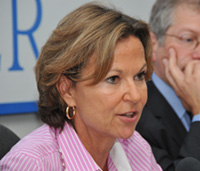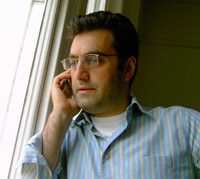
Family’s ‘truth teller’ speaks: Kati Marton at CPJ
Author and CPJ board member Kati Marton’s parents worked as foreign correspondents in Budapest during the Cold War in the 1950s, exposing Marton to the grit of living in a Communist state. She described feelings of alienation and displacement she felt as a child to an audience at CPJ’s New York offices today. “We lived…

Jailed journalist’s wife hopes for release in time for birth
On Monday, two weeks before her October 26 due date, Paola Gourley, the wife of jailed Iranian-Canadian journalist Maziar Bahari, at left, was rushed to the hospital after she suffered bleeding due to stress. From the London Metropolitan Hospital, her pleas for the release for her husband—who is nearing his 120th day in prison in…
Clinton raises impunity in journalist murders in Russia
When CPJ issued its recent special report Anatomy of Injustice: The Unsolved Killings of Journalists in Russia, we called on world leaders to join us in engaging Russian leaders on human rights, press freedom, and impunity. We were pleased to hear Secretary Hillary Clinton do just that today when she spoke about impunity at a…
CPJ makes headway in cases in Russia, Georgia
Amid ongoing attacks on journalists, CPJ advocacy in Europe and Central Asia has generated some positive results. Earlier this month, a CPJ delegation met with Russian and European officials, who promised to revisit 17 journalist murders in Russia since 2000. The declared commitment to reverse Russia’s grim record of impunity came after we presented our…
Russia, EU tell CPJ they will act on Russian murders
On September 15, a CPJ delegation released a special report in Moscow on impunity in journalist killings committed in Russia under the country’s current leadership. The report, Anatomy of Injustice, garnered an unusual amount of attention from the Russian media. Our press conference at the Independent Press Center was packed with journalists, both domestic and…
Journalists under threat: The psychology of sacrifice
Over the summer, as a book I’d written about the lives of murdered journalists went to press, a crusading human rights reporter from the Russian republic of Chechnya was shot dead. I was not surprised by the details of her murder, just as the Chechen reporter was not surprised she’d become a target for execution:…

Natalya’s death: You don’t kill a story by killing a journalist
We were only 30 on Friday: representatives of human rights organizations, a few journalists and academics, a couple of anonymous “concerned citizens.” Standing on the Place de la Liberté (Freedom Square) in Brussels two blocks from the Parliament, a few meters away from a police team that had asked us to limit ourselves to a…
Walter Cronkite’s press freedom legacy
Walter Cronkite had such a profound impact in so many ways that one might overlook an important part of his legacy–his long efforts on behalf of international press freedom and his advocacy on behalf of local journalists around the world. Cronkite was a vital participant in the launch of the Committee to Protect Journalists 28…
Global journalists rally behind Maziar Bahari
More than 100 prominent journalists from 47 countries sent a petition to the Iranian government today calling for the immediate release of Maziar Bahari, Newsweek’s Tehran correspondent, who has been held without charge in an Iranian jail since June 21. Compiled by CPJ, Index on Censorship, and Canadian Journalists for Free Expression, the petition was…
In Novaya Gazeta interview, Obama addresses impunity
Before he even arrived in Moscow, President Barack Obama gave an exclusive interview to an independent Russian newspaper that has long been on the front lines of press freedom. Novaya Gazeta is known for its ground-breaking investigative reports–and the fact that four of its journalists have been killed in retaliation for their work.